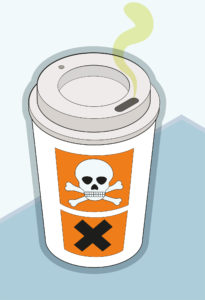** California Regulators Propose New Regulation That Excludes Coffee Makers from Acrylamide Prop 65 Warning **

By: Brent E. Johnson
As we blogged about recently, Defendants in the blockbuster Prop 65 case, Council for Education and Research on Toxics v. Starbucks Corp. et al., No. BC435759 (Los Angeles County Superior Court), argued that although acrylamide was listed as a Prop 65 chemical – and although acrylamide was present in coffee (created as part of the roasting process) – consuming coffee, itself, has not been shown to cause cancer and, therefore, a Prop 65 warning was unwarranted. Defendants went further, arguing that studies have actually shown that coffee reduces the risk of some cancers. The court disagreed with Defendants analysis, holding that the relevant question was whether acrylamide causes cancer – not coffee as a whole. The court also rejected Defendants’ arguments touting the overall health benefits of coffee, which would have permitted the court to apply a “public health” exception to Prop 65 labeling.
The result: coffee sellers in California have no choice but to label their beverages with a Prop 65 warning. With millions of coffee drinkers in California – most of them daily drinkers – the Prop 65 warning looks to become even more ubiquitous (and ignored).
But not so fast! The California Office of Environmental Health Hazard Assessment (OEHHA) just proposed a new regulation providing that cancer warnings would not be required for coffee, stating (in effect) that the health benefits of consuming coffee outweigh the cancer risk posed by acrylamide. OEHHA’s press release articulates that its proposed regulation is based on scientific evidence that drinking coffee has not been shown to increase the risk of cancer and may reduce the risk of some types of cancer: “In a review of more than 1,000 studies published this week, the World Health Organization’s International Agency for Research on Cancer (IARC) concluded that there is ‘inadequate evidence’ that drinking coffee causes cancer. IARC found that coffee is associated with reduced risk for cancers of the liver and uterus, and does not cause cancers of the breast, pancreas and prostate. IARC also found that coffee “exhibits strong antioxidant effects related to reduced cancer risk.” OEHHA’s Initial Statement of Reasons are linked here and make for interesting reading. The proposed regulation, which would fit under § 25704 of the implementing regulations, states: “Exposures to listed chemicals in coffee created by and inherent in the processes of roasting coffee beans or brewing coffee do not pose a significant risk of cancer.”
OEHHA’s approach to this proposed regulation is identical to that rejected by the court in the Starbucks case when it denied the coffee sellers’ request that it consider the wider science on the cancer risks/benefits of coffee rather than the limited question of harm from acrylamide. It is also an interesting development in so far as Prop 65 (Cal. Health & Safety Code § 25249.8 (a)) requires OEHHA to list chemicals that IARC identifies as carcinogenic but does not have a mechanism for exempting those products that IARC gives a green light.
OEHHA’s proposed regulation begs the question: What about other products that are inherently healthy but contain a Prop 65 chemical? For example, lead appears in trace amounts in dietary supplements that are made from botanicals. Should these supplements also get their own product-specific exemption from Prop 65 labeling?
